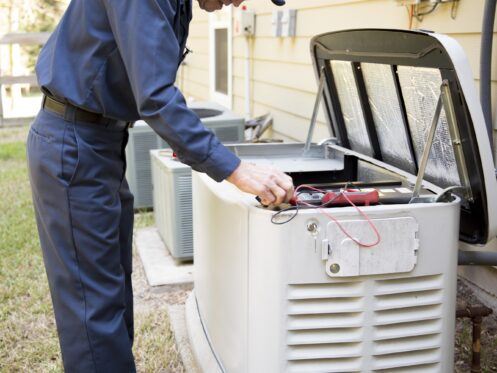Having a reliable source of power is important in any home. In a power outage, an emergency generator can be your best friend in keeping your household safe and comfortable. But how exactly does it work? Here, we cover what these generators are designed to do, the various types available and their respective advantages, common installation methods for different scenarios, and what to consider for safe operation. Understanding these topics can help you choose the best option for your home’s needs so that you’re fully prepared for an emergency.
1. How Do Home Generators Work?
Home generators use an engine to convert mechanical energy, such as that from gasoline or diesel fuel, into electrical energy. The engine powers a set of alternators that generate alternating current (AC) electricity. This AC is then passed through a rectifier that converts it into direct current (DC). Finally, the DC power is sent to the house’s electrical panel, which supplies power to the entire house.
2. Types of Home Generators
There are two main types of home generators: stationary or standby generators and portable generators. Stationary generators are permanently installed outside the home, usually near a fuel source such as a propane tank. These models have an automatic transfer switch that detects when power is lost and automatically turns on the generator to supply power until it is restored. This system can provide comprehensive protection for whole-home systems, often called whole-house standby systems.
Portable generators, however, can be moved around as needed and require manual operation each time they are used. They are typically powered by gasoline or diesel fuel, making them less expensive than stationary systems although less powerful in providing energy. Additionally, because they are not installed directly into the home, only certain circuits in the house will be powered at any given time.
3. Installation Methods
Given that home generators can be installed in either stationary or portable configurations, two main installation methods must be considered. For stationary systems, the generator is typically mounted on a concrete pad and connected directly to the home’s electrical panel via an automatic transfer switch. In addition, the system needs to be regularly serviced and maintained to ensure safe operation.
For portable generators, no permanent installation is required. However, all safety protocols must be followed when using a portable generator. You need to keep it away from any building or structure that can act as a flame spreader and run only one circuit per extension cord at any given time. However, all this should be done by a certified electrician to ensure the safety of your home. HR Phoenix in Richland Hills, TX provides professional electrical services and generator installation throughout the Dallas-Fort Worth area.
4. Safety Considerations
When using a generator, safety should be the top priority. Be aware of potential risks, and use caution when working with a generator. Here are some important safety considerations to keep in mind.
Purchase a Carbon Monoxide Detector
While generators can provide a reliable power source during an outage, they can pose serious risks if not properly used. One way to increase safety is to install a carbon monoxide detector. Carbon monoxide is a colorless, odorless gas that can build up quickly if a generator is not properly ventilated. Inhaling this gas can lead to serious health problems and, in some cases, even be fatal. Investing in a carbon monoxide detector can provide protection and help homeowners avoid such risks.
Check Local Permits and Guidelines
Another safety consideration is local permitting and installation guidelines. Depending on the type of generator you choose, there may be restrictions in place for installation or operation. It’s important to check with your municipality beforehand to make sure all applicable policies are being followed.
Additionally, make sure that any installer or electrician who works on your generator system is certified by a recognized organization such as the Institute of Electrical and Electronics Engineers (IEEE). This can help ensure that all safety protocols are properly followed during setup and use.
Keep the Generator Far From Open Windows or Doors
Finally, it’s important to keep your generator far from open windows or doors. This is especially true when using a portable generator, as exhaust fumes can quickly build up in enclosed spaces. Keep the generator at least 10 feet away from any windows or doors and, if possible, place it outside on an elevated platform for added safety.
5. Advantages of Home Generators
Home generators can be a great solution for ensuring your home is powered and heated in an emergency. They provide reliable power to ensure your appliances, lights, heating system, air conditioning unit, and other important systems are running correctly. Home generators also have several other benefits that make them a great investment.
Provides a Reliable Source of Power
The main advantage of having a home generator is the reliable source of power it provides in the event of an outage. A whole-house standby system can provide enough energy to keep the home running for hours or even days, while portable models are ideal for powering only essential circuits.
Protects Sensitive Appliances and Electronics
Having a generator can also protect sensitive appliances and electronics from damage due to sudden surges in voltage when power is restored after an outage. This is especially important for refrigerators and freezers, as their contents could quickly spoil without power. Additionally, generators can be used for recreational activities such as tailgating or camping trips where electricity may not be available.
Increases Home Value
Finally, having a home generator can also add to the value of your property. As the need for reliable power sources and backup plans grows, prospective buyers may be more willing to pay a premium for houses with generators already in place. This could give you an added financial benefit when it comes time to sell your home.
6. How to Maintain Your Home Generator for Longevity and Efficiency
Maintaining your home generator properly is important to lengthen its lifespan and ensure its efficiency. Here are a few steps you can take to keep your generator running smoothly.
Regularly Check the Fuel Source
The first step in maintaining your home generator is to make sure its fuel source, whether it’s gasoline or propane, is regularly checked and refilled if needed. If the proper type of fuel isn’t used for your particular model, the system could malfunction or incur damage.
Monitor Oil Levels
It’s also important to monitor the oil levels in your generator. This should be done regularly per manufacturer instructions to ensure sufficient lubrication for the system and prevent any overheating or engine wear. Additionally, make sure any oil you add meets the standards recommended by the manufacturer and contains no contaminants.
Schedule Regular Maintenance
Finally, it’s important to schedule regular maintenance for your generator. This should be done according to the manufacturer guidelines and include checking fuel levels, inspecting wiring connections, and replacing spark plugs or other wearable parts. Having a professional technician service your generator annually can help prolong its lifespan and keep it operating efficiently.
A home generator can provide a reliable power source during an outage and protect sensitive appliances and electronics from damage due to sudden surges in voltage. It can also add value to your property. However, it is important to use your generator safely and maintain it regularly. Doing so will help it to run efficiently for years to come.
At HR Phoenix in Richland Hills, TX, we provide residential and commercial generator services, rewiring, and electrical repairs, among other services, throughout the Dallas-Fort Worth area. Call us today to find out how we can help you.


